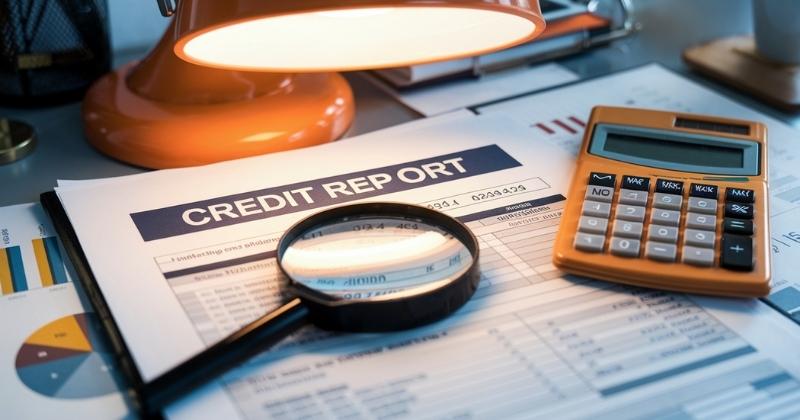
Your credit score is influenced by factors such as your payment history, total outstanding debt, recent credit inquiries, the types of credit accounts you hold, and the length of your credit history. There is no specific credit score required to secure approval for a credit card application. However, a higher credit score generally improves the likelihood of your application being accepted.
Key Takeaways
- Credit Scores And Approval In South Africa: A credit score of 650 or higher is generally considered favourable for credit card approval, but other factors such as income, expenses, and credit history also play a critical role in the decision-making process.
- Impact Of Credit Card Applications: Applying for a credit card results in a “hard enquiry” on your credit report, which may lower your credit score. It’s crucial to apply only when necessary and avoid multiple applications within a short time.
- Improving Your Credit Score: Key actions include paying bills on time, reducing outstanding debts, keeping spending below 30% of your credit limit, and resolving errors in your credit report with the responsible credit bureau.
About Arcadia Finance
Get the financial support you need with ease at Arcadia Finance. Benefit from no application fees and access a network of 19 reliable lenders, each adhering to South Africa’s National Credit Regulator standards. Experience a stress-free process tailored to your unique requirements.
What is a Credit Score?
A credit score is a numerical figure used to reflect an individual’s creditworthiness. It typically ranges between 0 and 999, though some platforms, such as Clearscore, may use a range from 0 to 705.
This score assesses the likelihood of a person repaying their debts, taking into account various factors such as payment history, the length of their credit history, and the types of credit accounts they have used.
A higher credit score is generally advantageous, as it suggests a lower risk to lenders. Conversely, individuals with lower credit scores are considered higher-risk borrowers, while those with higher scores are regarded as low-risk or financially secure.
Who Determines My Credit Score and What’s the Process?
A licensed credit bureau gathers and analyses a thorough record of your credit history and transactions, providing this data to the bank for assessment. This record is used to determine your credit score based on several factors, including:
- Your history of repaying debt.
- The total amount of money you owe.
- The types of credit you have applied for and the frequency of applications.
- The duration that your accounts have been active.
- The proportion of your available credit that you are currently using.
- Any instances where you failed to honour debt obligations, leading to bankruptcy or a court judgment against you.
Building a strong credit score starts with choosing the right financial products. Students with limited or no credit history should consider options designed specifically for them, like those in our Best Credit Card for Students in South Africa guide.

What Credit Score Is Needed for a Credit Card?
In South Africa, a credit score of 650 or higher is generally viewed favourably by creditors. Applicants within this range are more likely to secure approval for a credit card. However, approval isn’t guaranteed, as individuals with lower credit scores may also be considered, while some applicants with higher scores might still face rejection as a result of other factors.
Each financial institution follows its own criteria and processes when evaluating credit card applications. It’s advisable to contact the credit card vendor directly to confirm their specific requirements before proceeding with an application.
Did you know that the way credit scores are calculated varies by country? South Africa uses a slightly different credit scoring system compared to the United States. If you’re curious about the differences and how they might impact financial decisions, check out this guide on American credit score vs South African credit scores.
Can You Get a Credit Card if You’re Under 18?
To qualify for any credit in South Africa, you must be at least 18 years old. However, some credit card providers allow individuals over the age of 16 to be added to their parent or guardian’s credit card as an additional cardholder. This arrangement enables them to use a credit card issued in their name.
The additional card is linked to the primary account holder’s account, and the account holder will bear responsibility for all transaction charges. Moreover, any missed payments made by the additional cardholder will negatively impact the primary account holder’s credit score. It is therefore crucial for the account holder to ensure that the additional cardholder adheres to their repayment obligations.
How To Apply For A Credit Card
Applying for a credit card is generally straightforward, but the process requires attention to detail and some time.
- Compare Available Credit Card Options
- Check Eligibility Requirements
- Gather Necessary Documents
- Submit Your Application
- Await Application Review
- Receive Approval Or Rejection
- Sign Agreements And Collect Your Credit Card
While the process may differ slightly depending on the institution, it is vital to allocate sufficient time for research and careful review of the contracts. Make sure you fully understand the terms and conditions, and don’t hesitate to request adjustments if needed.
Information Required to Apply for a Credit Card
When applying for a credit card, you will need to share specific information about your identity and financial standing. This typically includes:
- Your South African ID Number: This is necessary to verify your identity.
- Details of Current Financial Obligations: This includes information about any existing credit cards, personal loans, vehicle finance, or other liabilities.
- Proof of Income and Employment: Documentation such as recent bank statements and payslips will be needed to assess your ability to repay.
- Asset Ownership Information: Details of any assets you own, such as vehicles, residential properties, or other real estate, may also be required.
If you’re struggling with bad credit, our guide to the Best Credit Card For Bad Credit In South Africa offers a pathway to rebuild your financial standing.

Key Points to Consider
There are several actions you can take to improve your chances of having your credit card application approved. Paying off any outstanding debts promptly and in full is one effective approach. However, it’s essential to remember that applying for a credit card will show up as a “hard enquiry” on your credit report. This can lower your credit score, whether your application is successful or not.
It is advisable to carefully evaluate your need for credit before submitting an application. Only apply for a loan or credit card if it is genuinely necessary. Additionally, avoid submitting multiple applications within a short period, as this can significantly impact your credit score.
The type of credit card you apply for can also influence your application’s outcome. Cards with higher limits, such as platinum or black cards, often require a high credit score. These cards usually come with a minimum limit of R15 000. If you are uncertain about approval, applying for a card with a lower limit may increase your chances of success.
Your credit score and report are critical factors that providers will assess when reviewing your application. However, they are not the only considerations. Credit card providers also evaluate details such as your income, expenses, number of dependents, and employment duration.
The stability of your employment is another important factor. For instance, contractors and commission earners may face additional scrutiny as their income is often viewed as less stable compared to full-time employees. Nevertheless, you can demonstrate reliability by showcasing the long-term nature of your contracts or your historical earnings and ensuring you perform well in other areas considered by credit providers.
Your credit score plays a crucial role in getting approved for premium credit cards with great cashback rewards. If you’re wondering whether you qualify, check out the Best Credit Card for Cashback in South Africa for options tailored to different credit profiles.
How To Improve Your Credit Score
If you are looking to improve your credit score, there are several steps you can take to clean up your credit record:
- Settle unpaid bills.
- Ensure all upcoming bills are paid on time.
- Pay more than the required minimum instalment on your accounts.
- Clear any outstanding credit card balances.
- Keep your spending below 30% of your total credit limit.
- Repay store accounts, mobile contracts, and loans – especially those tied to assets like a vehicle.
- Avoid opening new credit accounts unless absolutely necessary.
- Review your credit report for errors and address any issues with the credit bureau responsible for the calculation.
- Close accounts once the balance has been fully paid off.
If your credit score is currently too low to qualify for the credit card you want, don’t worry—there are actionable steps you can take to improve it. From paying off outstanding debts to managing credit utilization wisely, following these simple yet effective strategies can help you improve your credit rating and secure better financial opportunities.

How To Choose Your First Credit Card
Selecting your first credit card is a personal decision, but several factors are worth considering to ensure you make a suitable choice.

Fees And Interest Rates
Look for a credit card with a competitive interest rate and fees that are reasonable. Pay attention to any penalties, annual fees, or hidden costs that could impact your finances.

Rewards Programmes
Choose a card with rewards that match your spending patterns, such as cashback, loyalty points, or discounts. These perks can provide additional value when used wisely.

Credit Limit And Eligibility
Evaluate the credit limits offered by different cards and ensure they meet your financial needs. Check the eligibility requirements to confirm you qualify before applying.

Terms And Conditions
Carefully review the terms and conditions of the credit card agreement. Ensure you are comfortable with the repayment terms, fees, and any other obligations outlined in the document.
Alternatives If You Don’t Qualify for a Credit Card
If your credit card application is declined due to a low credit score or limited credit history, there are several alternatives available that can help you build or improve your credit profile. These options can serve as stepping stones towards qualifying for a standard credit card in the future.
Retail Store Cards
Some retailers in South Africa offer store cards with less stringent eligibility requirements than traditional credit cards. While these cards may have higher interest rates, they can be used to build credit if managed carefully by paying off balances on time.
Personal Loans With Smaller Amounts
Consider applying for a small personal loan if your credit score allows. Regular, timely repayments on a loan can help improve your credit score and demonstrate your reliability to lenders.
Credit-Building Loans
Some financial institutions offer credit-building loans specifically designed to help individuals with poor or no credit history. These loans are often small amounts, and payments are reported to credit bureaus to help boost your credit profile.
Savings and Budgeting
If you’re unable to secure any form of credit, focus on creating a robust budgeting plan and building savings. This ensures you have funds available for emergencies and minimises the need for credit.
Focus on Improving Financial Habits
If your credit score needs improvement, work on developing better financial habits before reapplying for a credit card. Some effective strategies include:
- Avoiding multiple credit applications: within a short period.
- Paying all your bills on time: to establish a positive payment history.
- Reducing existing debts: to improve your credit utilisation ratio.
Conclusion
Your credit score plays a vital role in determining your eligibility for a credit card in South Africa, but it is not the only factor considered. Financial institutions evaluate your income, expenses, and credit history alongside your credit score. Understanding the application process, choosing a card that suits your financial situation, and maintaining good credit habits can improve your chances of approval. By carefully managing your finances and credit usage, you can build a strong credit profile, increasing opportunities for future financial options.
Frequently Asked Questions
A credit score of 650 or higher is typically considered favourable for credit card approval. However, individual creditors may have different requirements.
Yes, some banks offer credit cards specifically designed for individuals with little or no credit history. These often come with lower limits and higher interest rates.
Yes, applying for a credit card results in a “hard enquiry” on your credit report, which can temporarily lower your credit score. It’s advisable to apply only when necessary.
You typically need a South African ID, proof of income (e.g., payslips or bank statements), and details of your current financial obligations when applying for a credit card.
To improve your chances, ensure you meet the eligibility criteria, settle outstanding debts, maintain a low credit utilisation rate, and choose a card suitable for your financial situation.
Fast, uncomplicated, and trustworthy loan comparisons
At Arcadia Finance, you can compare loan offers from multiple lenders with no obligation and free of charge. Get a clear overview of your options and choose the best deal for you.
Fill out our form today to easily compare interest rates from 16 banks and find the right loan for you.


